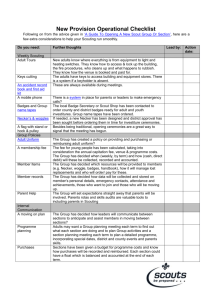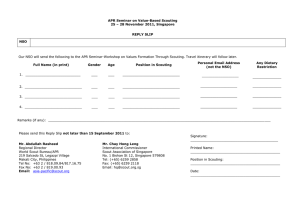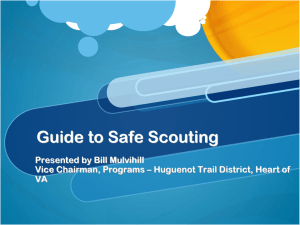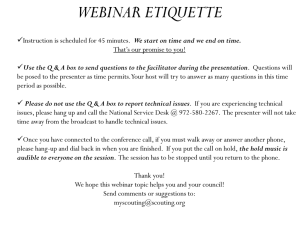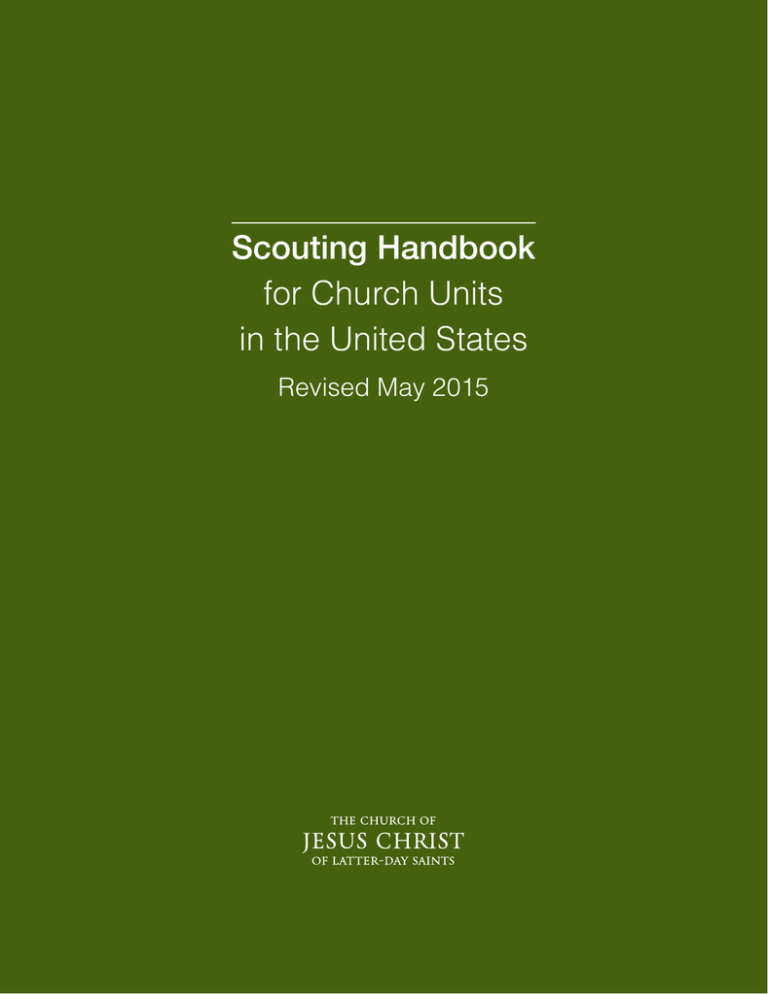
Scouting Handbook
for Church Units
in the United States
Revised May 2015
2012
Published by
The Church of Jesus Christ of Latter-day Saints
Salt Lake City, Utah
© 2012, 2015 by Intellectual Reserve, Inc.
All rights reserved.
English approval: 3/15
35814
1.0
Introduction
2.1
Stake Young Men and Primary presidencies also
provide ongoing training and support for ward
Young Men, Primary, and Scouting leaders. In addition, the BSA provides monthly roundtables to
help leaders learn Scouting methods and skills.
The BSA also offers a variety of optional training
courses, such as Wood Badge and the Trainer’s
EDGE. Stake and ward budget allowance funds
may be used for adult Scouting training.
This handbook outlines guidelines and policies
relating to Scouting programs in The Church of
Jesus Christ of Latter-day Saints. Bishoprics and
Young Men, Primary, and Scouting leaders should
be familiar with this information as they administer Scouting programs in the ward. Details about
each Scouting program are available from the Boy
Scouts of America (BSA) and are not included in
this handbook. Differences between Church policy and BSA policy are noted in this handbook as
needed. Unless otherwise noted, the term Scouting includes Cub Scouting, Boy Scouting, Varsity
Scouting, and Venturing.
1.1
2.0
Training courses that require overnight activi­
ties should not be attended by mixed groups of
adult men and women unless both genders have
appropriate sleeping and personal care arrangements that are not in immediate proximity to each
other. Where possible, leaders should attend training offered on days other than Sunday.
Purpose of Scouting in the Aaronic
Priesthood and Primary
Scouting can help young men and boys enhance close relationships with their families and
the Church while developing strong and desirable traits of character, citizenship, and physical
and mental fitness. Under priesthood leadership, Scouting should complement the efforts of
Aaronic Priesthood quorums and Primary classes
in building testimonies in young men and boys.
Scouting under Church sponsorship should become an extension of the home, Primary classes,
and Aaronic Priesthood quorums. Scouting functions as part of the Church’s activity program for
boys and young men. Scouting activities should
be planned to fulfill gospel-centered purposes.
2.2
Youth Protection Training (available online, to
be completed before service with youth begins
and repeated every two years).
█
█
█
Leader position-specific training for Cub Scout,
Boy Scout, Varsity, and Venturing leaders, or
Troop Committee Challenge for troop committee members.
Introduction to Outdoor Leadership Skills for
Boy Scout, Varsity, and Venturing leaders
(offered by BSA local districts and councils).
Priesthood Leadership Conference
on Scouting
In cooperation with the BSA, the Church
holds an optional Priesthood Leadership Conference on Scouting at the Philmont Scout Ranch in
Cimarron, New Mexico. This weeklong course is
for stake presidency members. It emphasizes the
priesthood basis for Scouting in Church units and
teaches how Scouting can be used to reinforce
priesthood purposes and gospel principles.
2.3
The Partnership Relationship
Priesthood leaders and other Church members may participate as volunteers in district,
council, and national Scouting committees and
activities to solidify relationships between Scouting and the Church and to improve the Scouting
program. Leaders should do everything possible
within Church policies to create good will, mutual understanding, and cooperation between
the two partners.
Training and Development
Young Men and Primary leaders who are called
to Scouting responsibilities should receive training
in Scouting principles, policies, and procedures as
used by the Church. Trained Scout leaders who
understand and live the gospel, understand priesthood governance, and understand the Scouting
program are better able to serve young men and
boys involved in Scouting activities. Accordingly,
adult leaders are considered trained when they
complete the following training:
Ongoing Training
2.4
LDS-BSA Relationships Committee
An LDS-BSA relationships committee should
be organized in each BSA local council to help
maintain and strengthen working relationships
between the Church and the BSA local council.
This committee includes a member of each stake
presidency within the BSA local council. An assigned Area Seventy chairs the committee or designates a stake president to be the chairman. If
a stake president is designated as chairman, he
provides the Area Seventy with regular reports at
coordinating council meetings or at other times.
The BSA council Scout executive or his designee
serves as an adviser to this committee.
1
3.0
Stake Leaders’ Responsibilities
for Scouting
3.1
Stake Presidency
ward Primary presidencies and provide ongoing
instruction and encouragement. They help ward
Primary presidencies understand Church Scouting policies and how Scouting and the Faith in
God program work together. They help plan day
camps when needed. See Handbook 2, 11.5.3 for
additional information.
The stake presidency sees that Scouting is organized and functioning in each ward in the stake;
that young men, boys, and leaders are registered;
and that all Scouting units are chartered. They also
develop a positive working relationship with the
BSA local council and district executive. A member
of the stake presidency serves as a member of the
LDS-BSA relationships committee and registers as
a member-at-large for the BSA local council.
3.2
Stake High Councilors
The stake presidency may assign high councilors who have assignments relating to the Aaronic
Priesthood and Primary to meet as an Aaronic
Priesthood committee to discuss Scouting-related
matters (see Handbook 2: Administering the Church
[2010], 15.3.2). These high councilors register with
the BSA as assistant district commissioners. They
receive appropriate BSA training, participate in
the monthly district commissioner meetings, and
work closely with the district commissioner and
unit commissioners in their stake.
3.3
Stake Young Men Presidency
Under the direction of the stake presidency,
the stake Young Men presidency conducts training and coordinates support for the individual
Aaronic Priesthood Scouting programs in each
ward. They orient newly called ward Young Men
presidencies and provide ongoing instruction and
encouragement. They register with the BSA as unit
commissioners, serving as liaisons to the individual Scouting units (troops, teams, crews) in the
stake. The stake presidency may designate other
members of the stake to serve with the stake Young
Men presidency as unit commissioners (see 3.5).
The stake Young Men presidency receives appropriate Scout leader training and participates
in district committee meetings and roundtables.
They also meet regularly with unit leaders, create
close relationships with them, help them with rechartering, and inform them of BSA district and
council activities, training opportunities, policies,
and health and safety issues.
3.4
Stake Primary Presidency
Under the direction of the stake presidency, the
stake Primary presidency coordinates support for
the individual Scouting programs in each ward
Primary organization. They orient newly called
2
The stake Primary presidency may register
with the BSA as unit commissioners, or the stake
presidency may designate other members of the
stake to serve as unit commissioners under the
direction of the stake Primary presidency. In making this assignment, the stake presidency should
be careful not to overburden members who have
other obligations. Unit commissioners function as
liaisons to the Cub Scout program and the Scouting program for 11-year-old boys in each ward
(see 3.5).
The high councilor assigned to the Primary informs the stake Primary presidency of training
opportunities and helps them provide support
and assistance to ward Primary leaders.
3.5
Unit Commissioners
Unit commissioners serve as resources to help
Scouting units succeed throughout the stake.
Each Cub pack, Scout troop, Varsity team, and
Venturing crew should be served by a unit commissioner. Members of the stake Young Men presi­
dency serve as unit commissioners. The stake
presidency may also designate members of the
stake Primary presidency or other stake members
as unit commissioners, as long as this assignment
will not overburden these members. Unit commissioners have the following responsibilities:
1. Register with BSA and receive required training.
2. Learn about Scout policies, procedures, and
evaluation programs.
3. Establish a close relationship with adult Scout
leaders in wards, interact with them regularly,
and report the condition of Scouting in the
stake to the assistant district commissioner.
4. Provide initial orientation, ongoing support,
and instruction for all Scout units in the stake.
5. Inform Scouting units of training opportunities, charter renewal deadlines, health and
safety issues, and activities in the stake and in
the BSA local district and council.
6. Provide meaningful communication between
Scouting units and the stake and between
Scouting units and the BSA local district. This
can be done at roundtable meetings, stake leadership meetings, or any other time.
4.0
Ward Leaders’ Responsibilities
for Scouting
4.1
Bishop
Qualified adults, including those who are not
members of the Church, may serve on these committees. Each committee should include a member
of the bishopric.
A Scouting committee can be as large as needed
to carry out its responsibilities to the individual
Scouting units. Where leadership or the number
of young men or boys is limited, one committee
could represent all young men of Aaronic Priesthood age and another committee could represent
Cub Scouting.
The bishop provides general direction for
Scout­ing in the ward and ensures that it is properly organized and functioning as outlined in this
publication and in Handbook 2, 8.13.4 and 11.5.3.
He is registered with the BSA and serves as the
executive officer for Scouting units chartered by
the ward.
4.2
When more than one Scouting committee exists
in the ward, members of the Primary presi­dency
should be assigned as follows: (1) the member
responsible for the 11-year-old boys serves on the
Boy Scout troop committee, and (2) the member
responsible for boys ages 8 to 10 serves on the Cub
Scout pack committee.
Bishop’s Counselors
The bishop’s counselors help the bishop by
overseeing the Scouting programs for boys ages
8 through 11 and Aaronic Priesthood quorums.
The bishop assigns a counselor to serve as the
ward’s representative to the local Scouting district and council. This counselor registers as the
chartered organization representative (COR). He
works with other leaders to:
Scouting committees:
1. Meet as needed to discuss Scouting in the ward
and receive assignments from the committee
chairperson.
1. Charter all Scouting units in the ward annually.
2. Register boys ages 8 through 11, young men
ages 12 through 15, and their adult leaders.
Young men ages 16 and 17 and their leaders
should be registered if the ward sponsors a
Venturing crew or if rank advancements are
being pursued.
3. See that tour and activity plans are completed;
signed by the bishop, the COR, or the committee chairperson; and submitted.
2. Support and assist Scouting activities by providing needed services.
3. See that the Scouting units operate in accordance
with Church and BSA policies and standards.
5.0
Scouting in the Aaronic Priesthood
5.1
Aaronic Priesthood Quorum Advisers
(Ward Young Men Presidency)
4. Attend the district committee meetings and the
annual council business meeting.
Generally, Aaronic Priesthood quorum advisers serve as the adult leaders of the Scouting units
in the ward. Both the adviser and the assistant
adviser(s) attend meetings of the quorum and
the Scouting unit and must be registered with
the BSA.
5. Attend Scout leader training.
6. Encourage all adults involved in Scouting to
become properly trained soon after their call.
7. Help organize a functioning Scouting committee.
8. Conduct the annual Friends of Scouting cam­­­­paign.
9. Help provide recognition for boys, young men,
and their leaders.
4.3
Scouting Committees
The bishopric organizes ward Scouting committees to ensure that Scouting functions properly
as a supporting activity for Aaronic Priesthood
young men and for boys ages 8 through 11. The
bishopric calls several capable adults (including
fathers and mothers of boys and young men) to
serve as committee members. One of the committee members is called to serve as the chairperson.
5.2
Youth Leadership
Scouting is part of the responsibilities of deacons and teachers quorum presidencies and the
assistants to the bishop in the priests quorum.
Planning for Scouting activities should be done
in presidency meetings and in the Scouting unit
leadership meetings. Sunday quorum meetings
should not become Scout planning sessions.
Each Scouting unit should be led by a young
man who is nominated by the bishopric and sustained by the quorum members. For Scouting
purposes, this constitutes an election. This leader
is usually the quorum president or an assistant
in the priests quorum, but another worthy young
3
man may serve, whether a member of the Church
or not. Other youth leaders of the Scouting units
are nominated by the quorum presidency, approved by the bishopric, and sustained by the
quorum members.
The quorum presidency, with help from their
quorum adviser(s), meets to correlate each Scouting activity with other quorum activities. The
president presides at and conducts the meeting.
If another young man is called to be the youth
Scouting leader, the president should invite him
to conduct the Scouting portion of the meeting
and show support for his leadership. Quorum
advisers attend this meeting to provide adult
support and direction to those who preside over
the meeting.
All Scouting meetings should open and close
with prayer and may include an inspirational
message by the adult unit leader (such as a Scoutmaster’s Minute).
6.0
Scouting in Primary
In Primary, the Faith in God program should be
coordinated with Scouting to lay a foundation that
prepares a boy to keep his baptismal covenants,
better serve his family, and receive the priesthood.
Careful planning is necessary to ensure that activi­
ties accomplish gospel-centered purposes.
Scouting supports boys and their families by
giving boys an additional opportunity to put into
practice the gospel principles they learn at home
and in Primary. Parental involvement is a key to
success in this program. Scouting also provides
boys with leadership opportunities and helps them
develop habits and attitudes of good citizenship.
Scouting activities and meetings for Primaryage boys are preferably held weekly in the daytime. Meetings may be held at the meetinghouse,
in a home, or in an outdoor setting and should
open and close with prayer.
6.1
Cub Scouting for Boys Ages 8 to 10
When properly carried out, Cub Scouting is a
fun, home-centered activity program. No Scoutsponsored overnight camping should be planned
for boys under age 11. Details for Cub Scout programs are published by the BSA and are available
through BSA local council offices.
6.2
Scouting for 11-Year-Olds
Latter-day Saint boys become Boy Scouts when
they turn 11. Although they are part of the ward
Scout troop, they function in their own patrol and
4
operate under the direction of the ward Primary
presidency. They can participate with the ward
Boy Scout troop in occasional daytime activities
as well as boards of review and courts of honor.
Scouting prepares 11-year-old boys to receive
the Aaronic Priesthood and transition into the
deacons quorum and Young Men program. Scouting can help them increase in confidence, testimony, brotherhood, and understanding of Aaronic
Priesthood duties. Eleven-year-old boys need to
establish good relationships with their peers, the
deacons quorum presidency, and their leaders.
Eleven-year-old boys meet separately from the
Aaronic Priesthood–age Scouts because they are
not yet part of a quorum. They preferably meet
in the daytime, but if evening meetings are necessary, the boys should not be away from their
homes late at night and must be carefully supervised until they return home.
Eleven-year-old Scouts participate in rank ad­
vancement. They are encouraged to complete as
many of the First Class rank requirements as possible before turning 12, with the exception of the
requirement for six overnight camps.
Eleven-year-old Scouts may participate in three
one-night camps a year, which meets the camping requirements for advancement to the rank of
Second Class. If desired, these overnight camps
may be held with the ward’s Boy Scout troop. The
eleven-year-old Scout leader plans the camps in
consultation with the ward Primary presidency,
the bishopric adviser to the Primary, and the ward
Scouting committee. No other Scout-sponsored
overnight camping should be planned for elevenyear-old Scouts.
Female leaders do not participate in overnight
camping with these boys. If the leader of the
eleven-year-old Scouts is a woman, the bishopric
adviser to the Primary or another qualified male
adult should be invited to supervise overnight
camps. Fathers are encouraged to participate in
overnight camps with their sons and with boys
whose fathers cannot attend.
In consultation with the ward Primary presi­
dency and the leader of the eleven-year-old Scouts,
the bishopric appoints one of the boys to serve as
the patrol leader. This patrol leader may meet occasionally with the older troop leaders when they
plan events that will include the eleven-year-old
patrol. The patrol leader should, with adult leader
assistance, choose assistant patrol leaders and assign other duties in the patrol as needed.
If a ward or branch has only one or two 11-yearold boys, the objective for them is the same—to
prepare them to receive the Aaronic Priesthood
and help them advance through the Boy Scout
program. Possible approaches to administering
the program in this circumstance include, but are
not limited to, the following:
6.5
2. Use the Lone Scout Program from the BSA.
The ward Primary presidency, under the direction of a counselor in the bishopric, has responsibility for Scouting for boys ages 8 through 11. The
Church does not participate in Scouting programs
for boys younger than 8 years old. A member of
the presidency is responsible to see that Scouting
is organized appropriately.
3. Combine with neighboring wards or branches
after considering distance, expense, and time
demands that this option might impose on the
families involved.
1. Register with BSA, receive BSA training, serve
on the appropriate ward Scouting committees,
and ensure that Church policies are followed.
1. Increase the size of the patrol through activation and missionary efforts.
6.3
The presidency member should:
If this last option is chosen, the Primary president and bishopric adviser continue to track the
progress of each boy from their ward or branch.
2. Coordinate Scouting with the Faith in God program to maintain a gospel focus.
At age 12, boys join the deacons quorum and
the Boy Scout troop.
4. Help leaders understand how Scouting can
strengthen the family and accomplish the purposes of Primary.
3. Encourage attendance at Scout leader training.
Day Camps
Day camps offer opportunities for boys to have
fun outdoors and complete outdoor requirements.
If the BSA local council does not provide day camps
or if they are not held within a reasonable travel
distance, a member of the ward or stake Primary
presidency directs the organization of day camps.
For example, a member of the ward Primary presi­
dency and the leader of the eleven-year-old Scouts,
with the help of the ward Scouting committee,
could organize a ward day camp for eleven-yearold Scouts. A Day Camp Guide for Eleven-Year-Old
Scouts is available online at LDS.org.
6.4
Ward Primary Presidency
Leader of the Patrol of Eleven-Year-Old
Scouts
Either the Primary teacher of 11-year-old boys
or another capable adult may serve as the group’s
Scout leader. This leader should:
1. Work under the direction of a member of the
Primary presidency and meet with her regularly to discuss the Scouting program and each
boy’s progress.
2. Register with the BSA as the eleven-year-old
Scout leader.
3. Attend the ward Scouting committee meetings.
4. Attend Scout training as applicable.
5. Attend other Primary meetings as invited.
6. Help each boy achieve the Faith in God Award
and advance in Scouting.
7. See that the boys participate in a day camp, and
help plan it if requested.
5. Visit Scout meetings and activities to support
and evaluate the quality of the boys’ experiences in Scouting. Review each boy’s progress
and participation in presidency meetings and in
the regular meetings with the bishopric adviser.
6. Help plan day camps and ensure that boys
have an opportunity to participate in them.
7.0
Awards and Recognition
The Church makes the following Scouting
awards and recognitions available to boys, young
men, and adult leaders:
On My Honor Award. This is the Latter-day Saint
religious award for young men in Boy Scouting,
Varsity Scouting, or Venturing. Scouts who are
members of other faiths may also earn the award.
On My Honor Adult Recognition. This recognition may be given to adult Scout leaders. Requirements for earning the award and suggestions for
presenting it are outlined on the application card.
Faith in God Award. Primary boys and boys of
other faiths, ages 8 through 10, can earn the BSA
Religious Square Knot Award by completing the
requirements in the Faith in God for Boys guidebook marked by the square knot icon.
Additional awards, including the BSA Reli­
gious Square Knot patch, are described in the
online BSA Guide to Awards and Insignia. Contact
your BSA local council office for information on
training awards and requirements.
For additional information, see LDS.org.
5
8.0
Church Policies
8.1
Standards
Church standards should be upheld at all Scoutsponsored activities. All Scouts and their leaders
who are registered in Latter-day Saint Scouting
units are expected to live the standards of the
Church as outlined in For the Strength of Youth.
8.2
8.4
The stake president may authorize small units
to combine for weekday activities as long as each
ward maintains a properly registered unit; each is
staffed with adult leaders; and retention, recruitment, and activation efforts are maintained by
each ward or quorum.
8.5
Members of the Church who serve in Scouting
assignments should be sustained and set apart
(see also 8.8). Others who request it may receive
a blessing from a member of the bishopric to help
them in their assignment.
The bishopric may call men or women to
serve as Scouting leaders for Primary-age Scouts.
Women do not serve as leaders for young men
of Aaronic Priesthood age, but they may chair or
serve on Scouting committees.
Each adult leader must complete a BSA adult
application. All adult Scouting leaders must be
properly registered and complete Youth Protection Training before beginning their service (see
8.6 and 8.8).
When possible, leaders should be allowed to
serve in Aaronic Priesthood and Scouting callings
long enough to become fully trained, establish
strong activity programs, and effectively touch
the lives of boys and young men.
All registration fees for youth and adults, including those of other faiths who join Latter-day
Saint units, are paid directly from Church headquarters to the BSA National Council.
Rechartering
Rechartering is the annual process by which
each Scouting unit renews its charter as an official part of the BSA. As part of rechartering, each
ward sends the BSA local council an updated
roster of the Scouting unit, including the names,
birth dates, and contact information of the registered youth in the unit. The roster lists all young
men ages 8 through 15. Young men ages 16 and
17 are listed only if they are pursuing rank advancements or if the ward sponsors a Venturing
crew. The roster must be signed by a member of
the bishopric.
All fees for rechartering, unit liability insurance, and annual registration, including fees for
those of other faiths who join Latter-day Saint
units, are paid directly from Church headquarters
to the BSA National Council.
The Church does not sponsor Scouting for girls
or young women. The Primary and Young Women
programs of the Church are designed to meet the
needs and interests of girls and young women.
6
Calling Adult Scouting Leaders
Worthy adults, whether members of the Church
or not, may be called to serve as Scouting leaders.
A current membership record of each member
called to serve in Scouting should be in the local
unit. All adult Scouting leaders must be properly
registered and must complete Youth Protection
Training before beginning their service.
Registration of Youth and Adults
Throughout the year, each ward ensures that
all youth and adults who participate in the BSA
are properly registered. Any youth who joins the
BSA for the first time must complete a BSA youth
application. If a registered youth joins a Scouting
unit in the ward after being a member of another
Scouting unit, the ward notifies the BSA local
council by sending the youth’s name, birth date,
and mailing address, along with a phone number
for a parent or guardian. This notification must be
signed by a member of the bishopric.
8.3
Combining Scouting Units
8.6
Youth Protection Program
The BSA requires all Scouting leaders to take
Youth Protection Training, which is available online or through the BSA local district or council.
8.7
Two-Deep Leadership
Two registered adult leaders or one registered
adult leader and a parent of a participant (one
of whom must be 21 years of age or older) are
required for all Scouting trips, outings, classes,
and meetings.
In situations that require personal conferences,
such as a Scoutmaster’s conference or merit badge
counseling, the meeting should be conducted in
view of other adults or youth.
When camping, no youth is permitted to sleep
in the tent of an adult other than his own parent
or guardian.
Adult leaders must respect the privacy of
youth in situations such as changing clothes and
taking showers at camp, and they should intrude
only when health and safety require doing so.
Adults should also protect their own privacy in
similar situations.
8.8
Background Screening for
BSA Adult Leaders
The BSA will complete a criminal background
check on all new adult leaders as part of the
registration approval process. This includes the
screening of Social Security numbers. A Scout
leader should not be sustained or set apart until
priesthood leaders ensure that the BSA has completed this process. Priesthood leaders should also
cooperate with BSA officials to resolve any issues
that may arise.
8.9
extension 2-4049). Leaders should also notify the
local BSA council.
For detailed guidelines on responding to accidents and reporting them, see Handbook 2, 13.6.20.
8.12
Keeping the Sabbath day holy is a commandment of the Lord and the practice of the Church.
The Church does not approve of hiking and
camping trips on Sunday. Scout groups should
not travel to or from camps on Sunday. Plans for
outings should ensure that Aaronic Priesthood
brethren and other members can fulfill their regu­
lar Church assignments.
As an exception, priesthood leaders may give
approval for a Church-sponsored Scouting unit
to participate in some BSA-sponsored national
and regional jamborees that occur over the Sabbath. This participation may only occur with
prior priesthood approval and with supervision
by authorized priesthood leaders. Members who
attend such events are not to participate in activities that are inappropriate for the Sabbath. Scout
uniforms may be worn during sacrament services
at these events.
Safety
Priesthood and Scouting leaders should refer
regularly to Handbook 2, chapter 13 for policies
and guidelines regarding activities and safety.
Leaders should also comply with guidelines in the
Guide to Safe Scouting, published by the BSA. This
publication is available online at scouting.org and
at BSA local council service centers. Additional
safety guidelines can be found on safety.lds.org.
Leaders should use the BSA Activity Consent
Form and Approval by Parents or Legal Guardian, as well as tour and activity plans, as required,
when planning activities and outings.
Activities should be appropriate for the participants’ ages, ability, and maturity. Leaders and
youth should have fitness levels appropriate for
the activity, and individual medical risk factors
should be carefully considered. Before holding an
activity, leaders should instruct all participants
in safety practices unique to the activity. Leaders
and youth should know and abide by all laws
and safety guidelines pertaining to the activity
or property.
8.10
Sacrament meetings are not to be held—and
the sacrament is not to be administered—outside
the boundaries of the ward or stake where the
priesthood leaders preside. Any exceptions must
be approved by a member of the Presidency of
the Seventy.
Scouting events (except approved long-term
camps) are not held on Monday evening, the night
designated for family home evening.
8.13
Emergencies
Accident Response and Reporting
Leaders should notify the bishop and stake
president promptly if an accident, illness, or
injury occurs on Church property or during an
official Scouting or Church-sponsored activity.
If the accident involves a fatality or overnight
hospital stay, leaders immediately notify the Risk
Management Division at Church headquarters
(telephone 1-801-240-4049 or 1-800-453-3860,
Scouting Month
February has traditionally been designated as
Scouting Month in the United States. Leaders of
Scouting units chartered by the Church may plan
and carry out approved activities to recognize this
tradition. However, in keeping with the purposes
of Sabbath observance, boys and leaders do not
wear their uniforms to regular Sunday meetings
or while administering and passing the sacrament.
Leaders should be prepared for emergencies
that may occur and know in advance how to contact law enforcement and emergency services.
8.11
Camping and Sabbath Day Observance
8.14
Travel
Leaders should follow the travel policies outlined in Handbook 2 (13.6.24). In addition, members who travel in Church-sponsored Scouting
groups should prepare tour and activity plans
and receive approval from appropriate priesthood
leaders. Church Scouting units may not own or
acquire automobiles or buses for travel.
7
When using private passenger vehicles, each
driver should be a licensed, responsible adult. All
vehicles and drivers should be covered by reasonable amounts of insurance.
8.18
As much as possible, programs and activities
should be planned to include Scouts with disabili­
ties. Young men or boys with mental, physical,
or emotional disabilities should be encouraged to
participate in Scouting to the extent their abilities
will allow. They may complete as many of the program requirements as possible. More information
about Scouting experiences for those with disabili­
ties is available at scouting.org and from BSA local
council offices. See also Handbook 2, 21.1.26.
Drivers should be instructed to obey all laws,
to make sure their vehicle is in safe operating condition, and to ensure that each person properly
uses a seat belt. Drivers should also be instructed
not to drive if they are drowsy, not to use mobile
phones while driving, and not to engage in other
behaviors that would distract them.
8.15
Funding Scouting
Leaders should follow the budget allowance
guidelines in Handbook 2 to fund Scouting (see
8.13.7, 11.8.7, 13.2.8, 13.2.9, 13.5, and 13.6.8). Ward
budgets should be used to purchase Scouting
awards and materials, as determined by local
leaders. Commercially produced or packaged
goods or services should not be sold.
8.19
Stake or ward Scout camps that involve more
than two units and that exceed three consecutive
nights for Venturers and five consecutive nights
for Boy Scouts and Varsity Scouts cannot be advertised as “Scout” camps unless they follow the BSA
national camp standards and are authorized by the
local council. If long-term camps do not qualify as
authorized Scout camps, they will not be covered
by BSA liability insurance. For long-term camping,
use of BSA facilities is strongly recommended.
The Church supports the BSA’s annual Friends
of Scouting drive. These funds provide financial
support for the BSA local council. Stake presidents
and bishops oversee the drive in their units.
Uniforms
Young men registered in a Scouting unit are
encouraged to wear the appropriate uniform. No
young man or boy should be excluded from Scouting if he is unable to purchase a uniform. Units
may wish to maintain a supply of used uniforms
to make them available for boys. Abbreviated or
simple uniforms and insignia, which have been
approved by the BSA, are appropriate and encouraged. Adult leaders are also encouraged to wear
appropriate Scouting uniforms, where feasible.
8.17
Young Men and Boys of Other Faiths
Young men and boys of other faiths who agree
to abide by Church standards should be welcomed and encouraged to participate in Scouting
activities. Expenses for their participation are paid
in the same manner as for other youth. Voluntary
contributions from their families may be accepted
and handled in accordance with Church policy.
8
Specialty, Multiple-Unit, and Long-Term
Camps
Latter-day Saint Scouting units are not authorized to organize “specialty” or similar programs
that focus exclusively on a particular skill, hobby,
or career.
Scouting units may participate in Scouting
shows, camporees, and other BSA activities that
involve the sale of tickets by boys or young men,
as long as all other budget allowance guidelines
are met.
8.16
Scouting for Boys and Young Men with
Disabilities
8.20
Official Scouting Activities and
Unauthorized Activities
An “official Scouting activity” is an activity that
is consistent with the established programs, values, charter, bylaws, and rules and regulations of
the BSA. The BSA’s Guide to Safe Scouting provides
important planning guidelines, along with a list of
unauthorized and restricted activities. These activi­
ties are not considered official Scouting activities.
Volunteers (registered and unregistered), units,
and chartered organizations will jeopardize insurance coverage for themselves and their organization if they engage in unauthorized activities.
Leaders should not put themselves, others, or the
Church at risk. (See the BSA’s Guide to Safe Scouting, section X, “Insurance.”)
8.21
Liability Insurance
There is insurance coverage through the BSA
for a Scout meeting or event that qualifies as an
official Scouting activity (see 8.20). The BSA provides primary comprehensive general liability insurance protection for registered Scout Leaders,
Scouting units, and chartering organizations.
The insurance provided to unregistered Scouting volunteers through the BSA’s general liability
insurance program is excess over any other insurance the volunteer might have available to him
or her. Vehicle or watercraft liability insurance
coverage through the BSA is provided on an excess basis. (See the BSA’s Guide to Safe Scouting,
section X, “Insurance.”)
8.22
Church Activity Medical Assistance (CAMA)
Church Activity Medical Assistance (CAMA)
applies to Church-sponsored activities, including Scouting. CAMA is administered by Deseret
Mutual (DMBA) and provides assistance to participants of activities sponsored by stakes, wards,
and branches of the Church in the United States.
No fees should be paid to the BSA local council
for accident and health insurance coverage. See
the current DMBA CAMA handbook for information on how this assistance is provided (visit
dmba.com/churchactivity for details or see Handbook 2, 13.6.9).
For personal liability insurance guidelines
within the Church, see Handbook 2, 13.6.9, which
states: “Where possible, [members] should protect
themselves by carrying reasonable amounts of liability insurance. Such insurance may be available
through homeowners insurance or other policies.”
The Church does not typically purchase primary liability insurance but uses Church funds to
defend and pay claims. On a case-by-case basis,
the Church may assist those who are sued in connection with Church activities. The Church will
attempt to exhaust all available coverage before
using Church funds. For official Scouting activities, there should be insurance coverage through
the BSA.
Neither the Church nor the BSA provides indemnification or defense coverage to individuals
who commit intentional or criminal acts.
9




